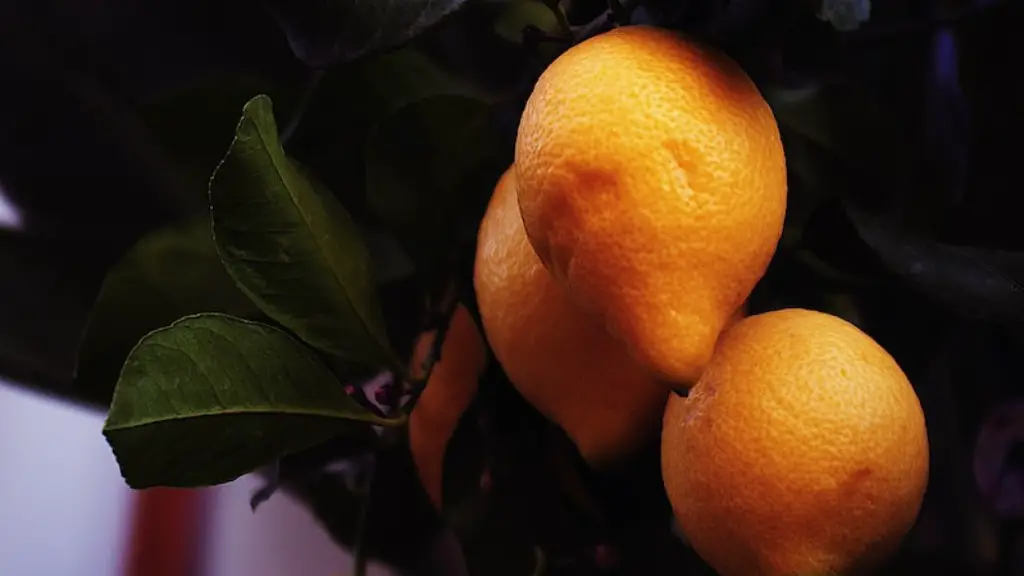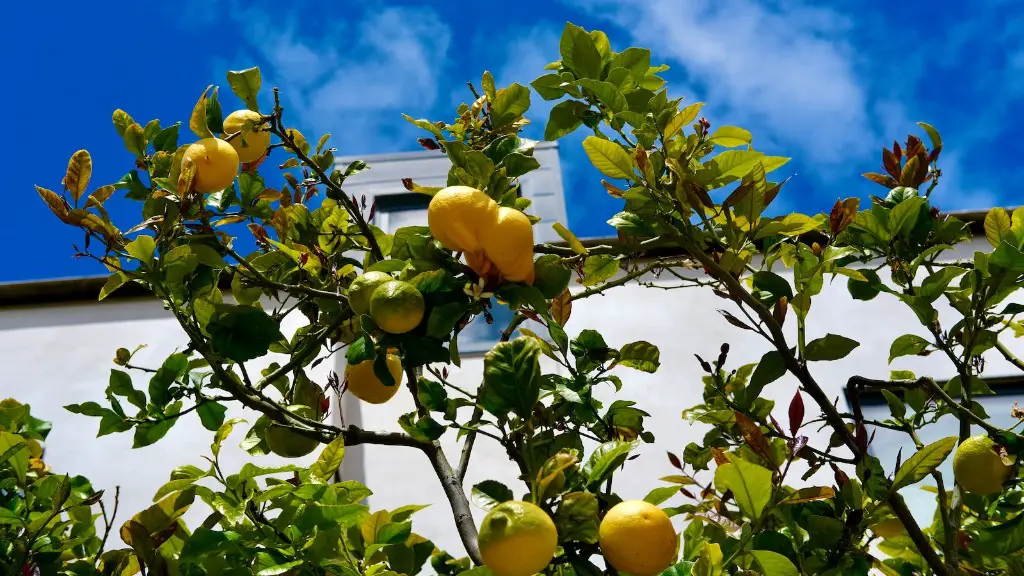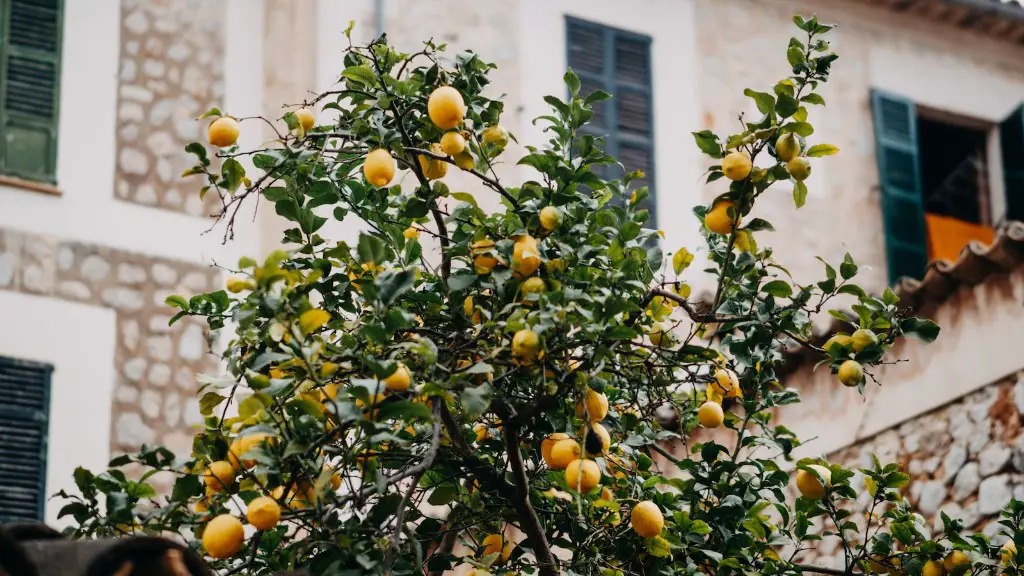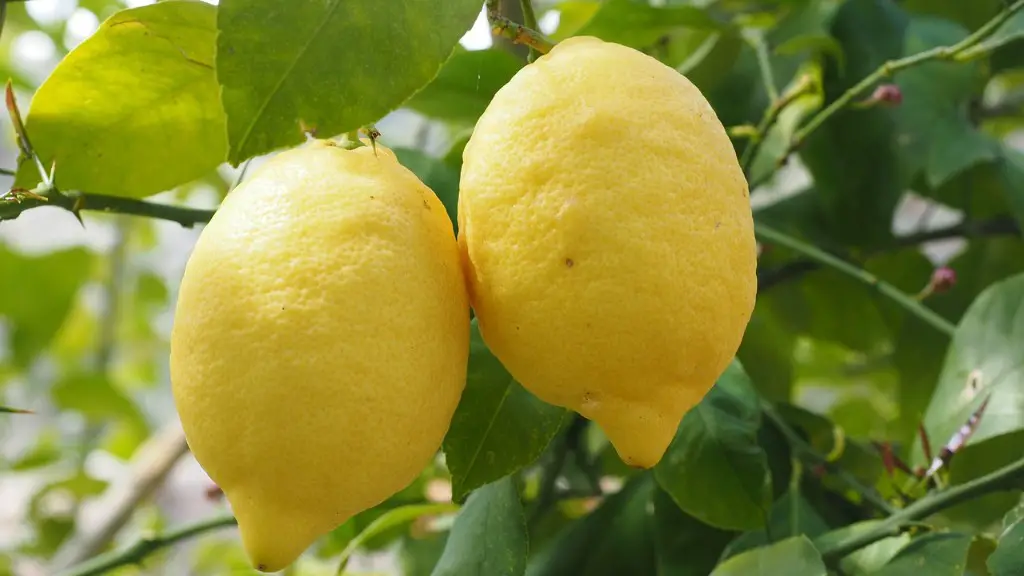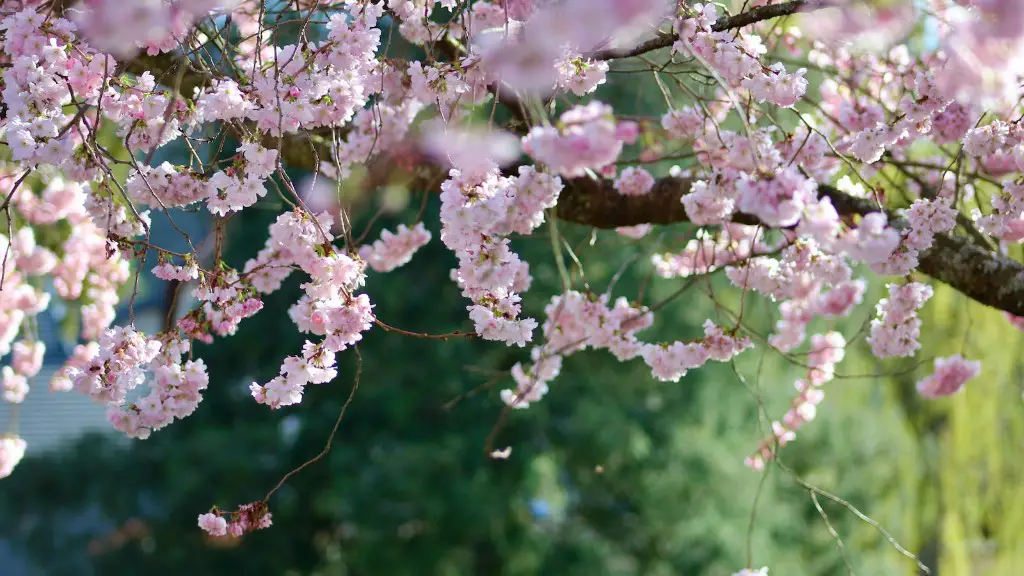Lemon trees have been a popular choice among gardeners for many years. Unfortunately, it is not uncommon to encounter a lemon tree that fails to produce fruit, even when it is healthy and cared for properly. This article will explore the potential causes of a lemon tree failing to produce fruit, and steps to take to correct the issue.
One possible explanation for a lemon tree not producing fruit is poor soil quality. Poor quality soil may be lacking in nutrients, or may contain too much salt or other contaminates. Additionally, a soil that is too wet or too dry may prevent a lemon tree from flowering or developing fruit. To correct this, it is important that the soil’s pH and macronutrient levels are tested and adjusted accordingly.
A second cause of a lemon tree not producing fruit may be an issue with pollination. Many citrus trees require cross pollination, meaning they need to be near another plant in order to have their flowers pollinated. If a lemon tree is planted away from other citrus trees, it may fail to produce fruit. To solve this, gardeners can hand pollinate their trees or plant more trees next to the one that is not producing fruit.
Poor pruning techniques may also be the cause of a lemon tree failing to produce fruit. Pruning techniques should be tailored to the specific species of citrus tree being grown. Pruning too harshly can cause the tree to put more energy into repairing itself than producing fruit. Pruning should be done with a light touch, with an emphasis on removing dead, diseased, and damaged branches rather than all excess foliage.
In some cases, an infestation of pests or diseases can cause a lemon tree to produce no fruit. In particular, citrus mites and citrus psyllids can cause young fruit to drop from the tree before it’s mature. Use of a systemic insecticide or fungicide is usually the best way to treat these infestations. In extreme cases, it may be necessary to remove and dispose of heavily infested branches.
Sometimes, insufficient water may be the cause of a lemon tree not producing fruit. Lemon trees require plenty of water in order to flower and set fruit, particularly during the warm summer months. Inadequate water can cause the leaves to wilt, leading to a reduced flow of sugars and nutrient to the developing fruit. Once water is supplied to the tree in adequate amounts, it should start to set fruit again.
Finally, inadequate fertilization can cause a lemon tree to fail to produce fruit. Lemons need certain nutrients in order to develop properly. Fruits grown without proper fertilization may fail to form properly or be small and of poor quality. Applying fertilizer according to the manufacturer’s instructions should correct the issue.
Soil Testing
Testing soil is an important step in diagnosing why a lemon tree is not producing fruit. Without a proper soil analysis, gardeners may be applying the wrong kind of fertilizer or attempting to correct the wrong problem. A solid knowledge of soil pH and macronutrients is important for successful lemon cultivation.
When testing soil, pH should be the first consideration. Citrus trees prefer a slightly acidic soil with a pH between 5.8 and 6.5. If the pH is too low or too high, it is important to add the necessary material to bring it back to the proper balance.
In addition to pH, much attention must be paid to the macronutrients in the soil. Macronutrients that are deficient in a soil must be added in order for citrus trees to develop and produce fruit. Primary macronutrients are nitrogen, phosphorus, and potassium, while secondary macronutrients are calcium, magnesium, and sulfur. Soil testing kits provide a general idea of the macronutrient balance in the soil, but soil analysis from a professional lab is usually necessary for a full picture.
Correcting soil issues is usually a slow process, so it is important to start working on it as soon as possible. Improving the soil quality may take months or years, depending on the extent of the problem, but it is a necessary step for successful lemon cultivation.
Once soil issues are corrected and the lemon tree is receiving adequate water and fertilizer, it should begin to set fruit. If the tree still fails to produce fruit, it may be necessary to consult a professional or search for the root of the issue elsewhere.
Pollination Considerations
When exploring why a lemon tree is not producing fruit, pollination is an important consideration. Pollination involves the transfer of pollen from the male anthers of one flower to the female stigma of another flower in order for the fruit to develop. There are three main methods of pollination for citrus trees- self-pollination, wind pollination, and insect pollination.
Self-pollination, also known as self-fertilization, usually only works when a flower contains both male and female reproductive organs. Since most citrus trees are not self-pollinating, the presence of another tree is generally required for fruit production.
Wind pollination may occur if pollen is blown from other trees and successfully lands on the stigma of the flower, but this method is not always reliable. Insect pollination is usually the most effective way to ensure successful pollination. This works best when a tree is surrounded by blooming flowers that attract pollinating insects such as bees and butterflies.
If there are no other citrus trees in the area, it is possible to hand pollinate the flowers. This involves transferring pollen from the male anthers of one flower to the female stigma of another flower with a paintbrush. Although laborious, hand pollination may be the only viable option in the absence of other trees.
Once the pollination issue is resolved, the tree should begin to set fruit again. If not, it may be necessary to look at other potential causes of fruit failure.
Pruning Strategies
Pruning a lemon tree is essential for successful fruiting, but it must be done correctly. Pruning techniques should be tailored to the specific species of citrus tree being grown. Pruning too harshly can cause the tree to put more energy into repairing itself than producing fruit.
In general, pruning should focus primarily on removing dead, diseased, and damaged branches rather than all excess foliage. To achieve a productive tree, a light touch should be used when pruning. This involves using thinning cuts to manipulate the canopy shape and selectively removing small, twiggy branches.
Pruning also helps control tree size and is essential for keeping fruit within reach. Smaller trees are easier to manage and can be trained to produce more fruit. Pruning to an open center form is usually the best way to maintain a manageable size and ensure the tree is capable of producing fruit.
With a light touch and proper technique, pruning can help maintain healthy growth and promote fruiting. Maintaining the neutral or slightly acidic pH necessary for lemon cultivation is also important for a successful crop.
Insect and Disease Prevention
Insects and diseases can cause serious damage to lemon trees and may be the cause of failure to produce fruit. Citrus mites and citrus psyllids feed on young fruits, causing them to drop prematurely and preventing them from maturing.
Insects can be managed using integrated pest management (IPM), which uses several methods of pest control such as biological control, cultural control, physical control, and chemical control. Biological control involves releasing beneficial predators in an environment to control pest populations naturally, while cultural control encompasses techniques such as weed control, crop rotation, and proper irrigation and fertility.
Physical control, such as pruning and burning, help keep pest and disease populations low, while chemical control involves the use of pesticide and insecticide sprays or systemic insecticides, which are sprayed or injected into the tree.
Admittedly, some of these techniques may cause more harm than good if not used properly, so it is best to consult with a professional if in doubt. Treating infestations is best done as soon as possible, since the longer the issue persists, the higher the likelihood of damage occurring and fruit being unable to set or failing to mature.
Fertilizing Strategies
It is important to replenish nutrients in the soil with proper fertilization to ensure lemon trees have the proper environment to develop and produce fruit. Nitrogen, phosphorus, and potassium are the primary macronutrients required for citrus cultivation.
Nitrogen helps new growth and encourages leaf production, phosphorus helps with healthy root development and flower and fruit formation, and potassium helps promote balanced and uniform growth. Calcium, magnesium, and sulfur are the secondary macronutrients and are also important for healthy citrus growth, but usually in smaller amounts.
It is important to apply fertilizer as a preventative measure, and not just when issues arise. Different citrus trees will have different fertilization needs, so depending on the specific species, fertilizer applications may need to be adjusted accordingly. Fertilizers can be applied in liquid form, as a dry granulated powder, or even through foliar feeding.
Fertilizers are best applied in multiple, lighter applications in order to reduce the chance of burning the roots or leaves. Applying fertilizer to a wet soil can reduce the nitrogen levels and may cause nitrogen leaching, so it is important to water the tree prior to fertilizer application.
When applied correctly, adequate fertilization should ensure that lemon trees are able to reach full growth potential and produce high-quality fruit. Inadequate fertilization may lead to reduced fruit yields, or poor-quality fruit that can’t be sold or consumed.
